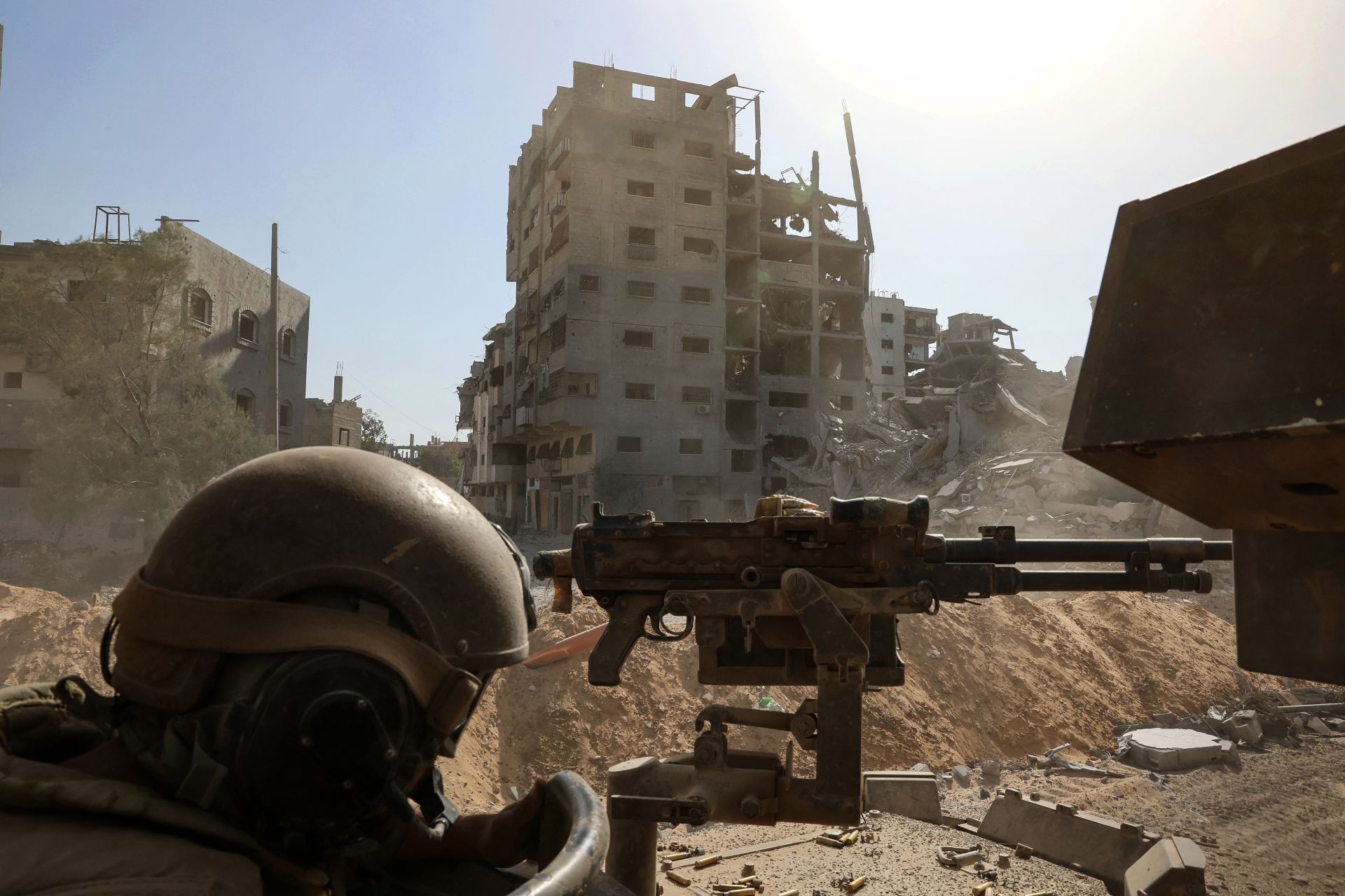- Home
- Middle East
- Where Does Trump’s Gaza Plan Stand?

An Israeli soldier behind a machine gun mounted near the Jordanian field hospital in Gaza City, October 3, 2025. ©Jack Guez / AFP
A new round of negotiations is starting in Egypt, this time centered on the Trump plan – touted as the path to a ceasefire and a full exchange between Israeli hostages and Palestinian prisoners. Yet the positions of the two sides remain irreconcilable, as the war enters its third year.
Cairo is once again at the heart of the diplomatic game. Israeli and Hamas delegations are expected to meet in Sharm el-Sheikh tonight and are set to begin indirect negotiations on Monday, under American mediation, in an effort to turn Donald Trump’s plan into reality. Unveiled on September 29, the plan promises a gradual ceasefire, the release of hostages, a phased withdrawal of the Israeli army, and, ultimately, the disarmament of Hamas.
Washington has dispatched President Biden’s envoy Steve Witkoff, along with Donald Trump’s son-in-law Jared Kushner. Both are tasked with overseeing the discussions. On the Israeli side, Benjamin Netanyahu says he supports the plan but warns that the army will retain control of certain so-called “strategic” areas of the Gaza Strip. Hamas, meanwhile, says it wants an “immediate” agreement but insists that all military operations and drone overflights be suspended before any exchange of hostages or prisoners.
The talks will be held in Sharm el-Sheikh, with both sides present in the same complex–though without direct contact. According to several Palestinian sources cited by Reuters and AFP, the current phase is mainly aimed at establishing the logistical conditions for a gradual transfer of hostages and detainees, under Egyptian and American supervision.
The US plan is structured around a three-step sequence: an immediate ceasefire, the release of Israeli hostages within 72 hours, and a gradual withdrawal of Israeli forces to a line between 1.5 and 3.5 kilometers from the border. In return, Israel would free about 250 Palestinian prisoners serving life sentences and more than 1,700 detainees arrested since October 2023.
On Saturday, Donald Trump again escalated his rhetoric, warning that he “would not tolerate any delays” in implementing his plan. He told Axios, “This is Netanyahu’s chance to win.”
In a text exchange with a CNN journalist released Sunday, Trump said that Netanyahu is now “ready to halt the military offensive in Gaza.” The American president added that he expects to know “very soon” whether Hamas is genuinely committed to peace, warning that if the group refuses to relinquish power, it will face “total destruction.”
But the Israeli army continues its offensive in Gaza City despite Washington’s calls to halt the shelling. Local civil defense reported at least 57 deaths on Saturday and five more on Sunday morning.
On CBS, US Secretary of State Marco Rubio said Sunday that once all parties agree on the logistical arrangements, “Israelis and everyone will recognize that it is impossible to free hostages amid the strikes, so those strikes will have to stop,” adding that an agreement on these arrangements must come “very quickly.”
From Washington, Rubio, cited by The Jerusalem Post, expressed optimism: “Ninety percent of the issue has been resolved, and we are finalizing the logistical details.” According to him, “Hamas has fundamentally accepted Donald Trump’s peace plan” and “has also agreed, in principle and in broad terms, to endorse this idea and what will follow.” Rubio, however, acknowledged that “many details still need to be worked out,” saying he expects “an outcome early this week.”
Many sticking points remain. Hamas still refuses any discussion of disarmament and rejects the idea of governing Gaza without its participation. The US plan proposes a transitional authority without Hamas, under international supervision—an option the Palestinian group deems unacceptable, while insisting it wants “to contribute to the management of the territory after the war.”
Friday evening had already thrown the situation into confusion. Donald Trump had just threatened “hell like never before” against Hamas after issuing an ultimatum demanding acceptance of the plan. A few hours later, the Palestinian movement issued an ambiguous statement, suggesting it would “respond favorably” to a ceasefire, without ever fully endorsing the plan. With ongoing shelling in Gaza City that same evening, witnesses described a “deceptive calm.” Israel stated that its operations would continue “until the full implementation of the plan.”
On the eve of the second anniversary of the October 7 attack, the stakes reach beyond the mere release of hostages. Former British Prime Minister Tony Blair, tasked with coordinating a future international reconstruction committee in Gaza made up of technocrats, is also expected in Egypt. The negotiators have different priorities but face the same pressure: to prove that this plan can go beyond its initial intentions.
Read more



Comments